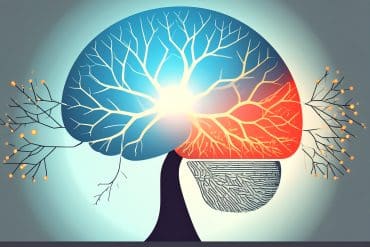Summary: Seizures associated with Alzheimer’s disease in both animal models and humans alter hippocampal neurogenesis. Treating mice with antiseizure medications normalized neurogenesis and improved spatial discrimination.
Source: Baylor College of Medicine
Memory impairment and mood changes are typically observed in patients with Alzheimer’s disease but what disturbs these neuronal functions is unclear. Some researchers have proposed that alterations in the production of new neurons in the brain, or neurogenesis, may be involved; however, whether neurogenesis happens in humans, much less those with Alzheimer’s disease, has been debated. A discovery published today in the journal Cell Reports provides a possible explanation for this debate and may shed light on what happens in Alzheimer’s disease.
Working with animal models of Alzheimer’s disease, a team led by researchers at Baylor College of Medicine discovered that seizures that are associated with the disease both in animal models and humans alter the normal dynamics of neurogenesis in adult brains. Administering anti-seizure medication restored neurogenesis and improved performance in a spatial discrimination task.
“Whether neurogenesis is altered at all in patients with Alzheimer’s disease is a controversial topic in the field. While some groups present evidence supporting a decrease in neurogenesis, others claim that it increases or that there is no change,” said corresponding author Dr. Jeannie Chin, associate professor of neuroscience at Baylor College of Medicine. “Working with mouse models of the disease we have identified a mechanism that we propose may integrate all of these various findings.”
Neurogenesis is altered in animal models of Alzheimer’s disease
Scientists have found that in normal mice neurogenesis occurs throughout life and decreases as the animals age. Neurogenesis is a multistep process that begins with the proliferation of neural stem cells, continues with the production of intermediary cells such as progenitor cells, and ends with new neurons being born. Findings from Chin’s collaborators demonstrated that the pool of neural stem cells in the brain is finite. After a certain number of cell divisions, a neural stem cell stops being a stem cell, and is not replaced. Consequently, throughout the life of normal mice, the number of neural stem cells progressively decreases.
“In this study, we compared the process of neurogenesis in normal mice with that in our mouse model of Alzheimer’s disease, and found that the processes are similar but, when seizures occur in mice with the disease, neurogenesis is acutely stimulated,” said first author Chia-Hsuan Fu, neuroscience graduate student in the Chin lab.
The researchers observed that early in the disease when seizures begin, there is an increase in neurogenesis as neural stem cells are stimulated to divide. As the disease progresses and seizures recur stimulating more neural stem cells, the cell pool is depleted faster than in animals without the disease, and neurogenesis decreases. Later in the disease, when the pool of cells is exhausted, there is very little neurogenesis.
“These findings indicate that in the mouse model of the disease, seizures accelerate the normal process of neurogenesis. The pool of neural stem cells that generates new neurons is exhausted faster than in mice without the condition,” Fu said.
“Although our study was conducted in mice, we suggest that the level of neurogenesis in a human brain with Alzheimer’s disease may similarly depend on the stage of the disease, being higher at very early stages and then declining more rapidly than normal as disease continues,” Chin said. “The level of neurogenesis would depend on when during the disease the samples were taken. These findings may explain the seemingly contradictory findings about whether and how neurogenesis is affected in Alzheimer’s disease.”
Chin also speculated that the mechanism they discovered may also help explain controversial studies regarding whether adult neurogenesis, which has primarily been studied in rodents, occurs at all in humans. “Depending on the medical history of the patients from whom the brain samples were obtained, they might have high, low or even nonexistent levels of neurogenesis at the time of death,” Chin said.
Interestingly, when the researchers treated their mouse model with anti-seizure drugs they normalized the dynamics of neurogenesis. Further, animals treated with anti-seizure drugs improved their performance in a spatial discrimination task when compared with non-treated mice. Taken together, the findings suggest that the seizures are deeply connected to the alterations in neurogenesis and cognitive functions both in Alzheimer’s disease and epilepsy.
They were expecting that accumulation of amyloid-beta in the brain, a major hallmark of the disease, would also affect neurogenesis as suggested by experiments in the labs of other groups, Chin said. However, the observations of Chin and her colleagues suggest that the effect of seizures on neurogenesis seems to be larger than that of amyloid-beta accumulation.

The finding that anti-seizure medications can normalize the process of neurogenesis in a model of the disease suggests that it also might be possible to do so in human patients.
“However,” Chin remarks, “more work is needed and caution is necessary because the medication would have to be administered early in the disease, just as seizures are beginning to occur.”
Other contributors to this work include Daniel Maxim Iascone, Iraklis Petrof, Anupam Hazra, Xiaohong Zhang, Mark S. Pyfer, Umberto Tosi, Brian F. Corbett, Jingli Cai, Jason Lee, Jin Park, Lorraine Iacovitti, Helen E. Scharfman and Grigori Enikolopov. The authors are affiliated with one or more of the following institutions: Baylor College of Medicine, Thomas Jefferson University, New York University Langone Medical Center and Stony Brook University.
Funding: This work was supported by the National Institutes of Health (grants NS086965, NS085171, NS075839, NS086965, AG040209 and NS086965) and the New York State Office of Mental Health.
Source:
Baylor College of Medicine
Media Contacts:
Graciela Gutierrez – Baylor College of Medicine
Image Source:
The image is in the public domain.
Original Research: Open access
“Early Seizure Activity Accelerates Depletion of Hippocampal Neural Stem Cells and Impairs Spatial Discrimination in an Alzheimer’s Disease Model”. Jeannie Chin et al.
Cell Reports. doi:10.1016/j.celrep.2019.05.101
Abstract
Early Seizure Activity Accelerates Depletion of Hippocampal Neural Stem Cells and Impairs Spatial Discrimination in an Alzheimer’s Disease Model
Highlights
• Seizure-induced NSC proliferation in AD mice accelerates the depletion of the finite NSC pool
• Hippocampal neurogenesis is increased early, but decreased later, in disease
• Reduced neurogenesis coincides with deficits in spatial discrimination in AD mice
• Antiseizure drug normalizes neurogenesis and improves spatial discrimination in AD mice
Summary
Adult hippocampal neurogenesis has been reported to be decreased, increased, or not changed in Alzheimer’s disease (AD) patients and related transgenic mouse models. These disparate findings may relate to differences in disease stage, or the presence of seizures, which are associated with AD and can stimulate neurogenesis. In this study, we investigate a transgenic mouse model of AD that exhibits seizures similarly to AD patients and find that neurogenesis is increased in early stages of disease, as spontaneous seizures became evident, but is decreased below control levels as seizures recur. Treatment with the antiseizure drug levetiracetam restores neurogenesis and improves performance in a neurogenesis-associated spatial discrimination task. Our results suggest that seizures stimulate, and later accelerate the depletion of, the hippocampal neural stem cell pool. These results have implications for AD as well as any disorder accompanied by recurrent seizures, such as epilepsy.






